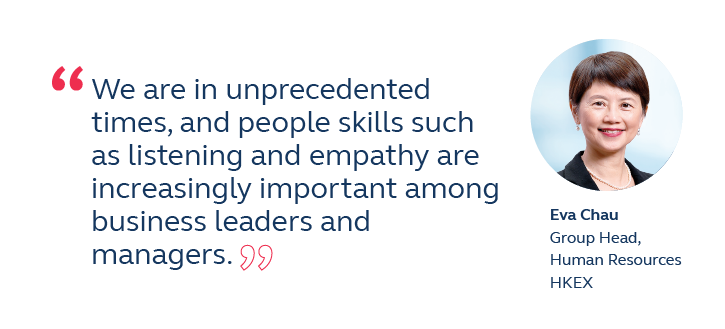By Eva Chau, Group Head of Human Resources, HKEX
A global health pandemic, economic uncertainty and macro socio-political pressures have dramatically altered the business landscape for companies around the globe in 2020. Companies in Hong Kong have not been immune to these shifting dynamics and corporate leaders and managers have to adapt and embrace new and broader skills to help them effectively navigate the path ahead.
At Hong Kong Exchanges and Clearing Limited (HKEX), we are celebrating our 20th anniversary as a public company, which gives us an opportunity indulge in our history and consider how our world is changing. As the head of human resources at HKEX, I am seeing significant changes in the types of skills and talent that we need to build upon our success and create a sustainable future.

People Skills Prevail
Over the last decade, certain important management skills have become de-emphasised because of the increasing demand for STEM talent for technology-centric jobs. In these rapidly changing and uncertain times, emotional intelligence is a key differentiator to success. Skills such as listening, empathy, and communications are increasingly important among managers and business heads. Emotional engagement and compassion, often not a pre-requisite for hard-headed business leaders, are coming to the fore.
Business leaders are celebrated for displaying these skills, and demonised if they do not.
For example, Larry Fink, Chairman and CEO at BlackRock, once again showed empathetic leadership with a widely shared letter to employees about the Black Lives Matter movement, while Greg Glassman, CEO of CrossFit, failed to do the same in his communications and ended up resigning from his post.
These people skills are not often taught in universities or emphasised when cultivating, assessing and rewarding management talent. This not only makes them harder to find, but it puts greater responsibility on companies and their human resources functions to foster and reward them. Traditional performance reviews and promotion often focus on quantifiable performance targets and teamwork, and few fully recognise people skills, and reward employees for putting them into practice. This is especially true among financial institutions, and it needs to change.
Agile and Creative Leadership
In the wake of COVID-19, the global adoption of work-from-home (WFH) practices has changed the traditional workplace forever. This poses a number of challenges for managers, as running a team remotely demands different skills and greater intuition than office-based face-to-face team management. When the currency of physical signal is lost, it becomes more difficult to detect when staff are stressed, overworked or in need of guidance. This in turn, results in demands for more seasoned managers, with more developed inter-personal skills, empathy and experience.
Managers also need to be more agile than before, to be able to accommodate and respond to a faster and more dynamic operating environment and react to unexpected scenarios in real time. Judgement and discretion, which have always been valued attributes of good managers, are of heightened importance in high-pressure environments. Hiring leaders who have the experience to make prompt decisions in a fair manner, weighing risk and reward, has never been more important. We are faced with an increased number of situations that have no precedents, and experience, creativity and an ability to assimilate complex information is needed to produce solutions that work for the team and the business.
A Global and Diverse Approach
The COVID-19 pandemic and the dynamic socioeconomic and political shifts around the globe are also changing the landscape for top international talent recruitment. The hunt for talent is becoming super competitive. While Hong Kong’s position as the global markets leader in the Asian time zone owes much to our ability to attract top international talent, other international finance centres such as London and New York also rely heavily on international talent in order to maintain their cosmopolitan flair and business best practices.
International talent is attracted to a workplace with genuine diversity that welcomes new ideas, appreciates global trends, cultures, and stakeholders. That talent appreciates flexibility, opportunity and growth prospects. If talent is good enough to go anywhere, you must give them a reason to choose you.
While some reports suggest that talent is leaving Hong Kong, the recruiters I speak to on a daily basis, and my own anecdotal observations, suggest that that is not necessarily the case. Hong Kong as a major global city and international financial centre at the crossroads of geography, politics, and economics, presents an appealing destination for global talent. I do not expect that to change, even if the competition for talent is increasing.
The current socioeconomic challenges are complex, and often confrontational and divisive in nature, which further increases the demand for strong people skills in the professional workplace. Issues of race, politics, and social and economic divide are all deeply emotional issues. In this kind of environment leaders who truly embrace diversity with compassion and wisdom will flourish. They will be able to bring people of differing experiences, viewpoints, and values together and bridge those gaps in order to work on common professional goals.
Developing Leaders of the Future
HKEX is taking steps to develop these important leadership skills amongst our managers and leaders of today, and for the next generation too. We promote board diversity and gender equality, shared values, and a belief that our role as a corporate extends far beyond profits. Great leaders are never complacent, but rather they adapt and are on a lifelong journey of learning. As we celebrate our 20th birthday as a listed company, and reflect on our journey, we know that attracting, retaining and developing talent with the right people skills for the future is one of our greatest challenges and opportunities.
Credit: This article first appeared in HR Asia on 10 July, 2020